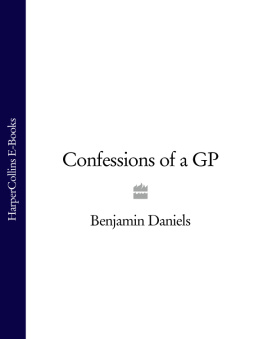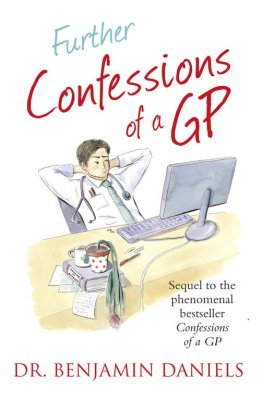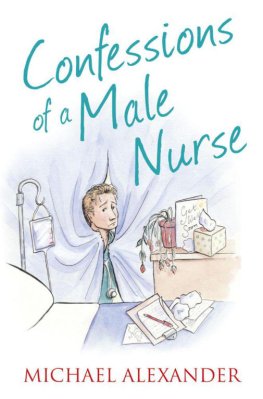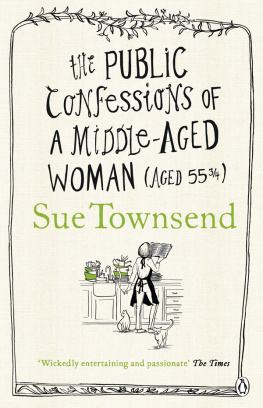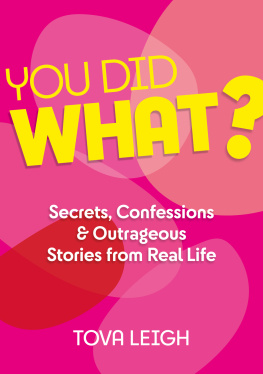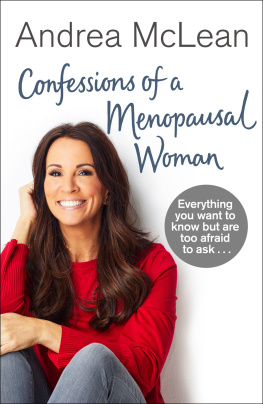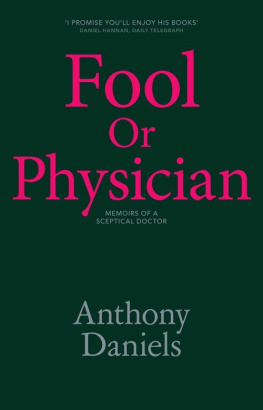The events described in this book are based on my experiences as a new GP. For obvious reasons of privacy and confidentiality I have made certain changes, altered identifying features and fictionalised some aspects, but it remains an honest reflection of life as a young doctor in Britain today. This is what its like. These things really happen!
Humans have a universal desire to be listened to and share their stories of pain and suffering. My job as a GP is to listen to those stories. Sometimes I interject with some suggestions or medications, but more often I am simply a passive observer of the soap operas that are peoples lives. With regular appointments, I watch the characters develop and the narratives unfold. Although some of my patients have an overinflated view of my significance, I really am just a walk-on part in their lives. Im like the extra in the corner of the Queen Vic who tries his best to play a small role in one or two of the storylines, but in reality rarely affects the progress of the plot or the big ending. The advantage I do have is that I get to watch the story unfold from a unique and fascinating angle. Being a doctor gives me a privileged insight into the more private and often bizarre aspects of human life and, with that in mind, let me share some slices of my working life with you.
Introduction
I love my job and have no regrets about choosing to become a doctor and then a GP. This is quite fortunate really, as my decision to study medicine was made as I chose my A levels at the tender age of 16 . At this time my only real reservation against becoming a doctor was the knowledge that I would have to endure chemistry A level. I couldnt really think of any other reason why I shouldnt be a doctor. What could be better that swanning around a hospital full of beautiful nurses and saving lives? People would think I was great and ultimately this would lead to me finally getting a girlfriend. As an awkward 16-year-old with bad skin and greasy hair, most of my career aspirations were based on what profession would give me the best opportunity of gaining me some interest from the opposite sex. I had accepted that my carnal ambitions would ideally be achieved by being in a boy band or playing premiership football, but unfortunately my lack of talent in both these departments led to the inevitable choice of medicine. I chose my A levels in the year that ER first arrived on our screens. A poster of George Clooney in a white coat was on every girls wall. Of course I wanted to be a doctor!
On my university application form, I had the good sense to not write that I wanted to be a doctor so I could save lives and hence get laid. I scribbled down something about my love of working as part of a team and my fascination with human sciences. To be fair, I suppose these statements were also true, but it is so hard to pick a career aged 16. The real world of work is always such a mystery until you enter it. When my mate Tom applied to teacher-training college, he wrote that he wanted to help young people flourish and fulfill their true potential. After a five-year tour of duty in an inner city comprehensive school, like us medics, he is just trying to get to the weekend without being punched or sued.
Although Im now a GP, my training required me to spend many long years working as a hospital doctor. I completed five years at medical school and then spent several years working in various hospital posts gaining the experience needed to become a GP. I was a junior doctor in surgery, psychiatry, A&E, paediatrics, gynaecology, geriatrics and general medicine. I also broke up my training with a three-month stint working in Mozambique. All in all I loved working as a hospital doctor but have absolutely no regrets about leaving it to become a GP.
I can still fondly recall the first diagnosis I ever made. As with many others that followed, it was spectacularly incorrect, but it still holds a special place in my heart. In my defence, I was just a mere boy at the time, wet behind the ears and only a few weeks into my first term at medical school. I was sitting in the local Kentucky Fried Chicken and spotted a man slumped unconscious in his plastic seat. A wave of excitement flooded over me. This was what it was all about! This was my vocation! With the limitless enthusiasm of youth and inexperience, I bounded over to undoubtedly save his life with my new-found wealth of medical knowledge.
It didnt take me long to conclude that this gent had suffered from a spontaneous pneumothorax. This was not based on clinical signs and symptoms but more that this was the condition that we had learnt about that morning in a tutorial and so was the first and only diagnosis that sprung to mind. With an air of self-importance, I explained to the KFC manager my diagnosis and instructed him to call urgently for an ambulance. Looking thoroughly unimpressed, he wandered out from behind the counter and roughly manhandled the unconscious man from his seat and threw him out of his restaurant. My first-ever patient spectacularly regained consciousness, uttered a few obscenities addressed to no one in particular and staggered off down the street. The KFC manager in his far superior wisdom had, in fact, made the correct diagnosis of drunk and asleep and prescribed him a swift exit from his premises.
I can see why the professor chose to teach us innocent medical students about a spontaneous pneumothorax that morning. It is, in fact, a wonderful feel-good condition for doctors. An otherwise healthy person collapses with a deflated lung and then the clever doctor diagnoses it with his stethoscope and sticks a needle between their ribs. With a triumphant hissing sound, the lung inflates and the patient feels much better. The professor was trying to help explain the normal functioning of the lung and what could go wrong. He was also trying to encourage us to embrace the wonderful healing abilities we could have as doctors. Back during those early days of medical school I believed that most of medicine would be that straightforward. Someone would be unwell, I would do something fabulous and then they would get better.
Funnily enough, despite a spontaneous pneumothorax being the first medical condition I ever learnt about at medical school, I have, in fact, never actually seen one since. Looking back, I wonder if actually a far more useful and accurate introduction to being a front line NHS doctor would have been a tutorial on how to remove a semiconscious drunk bloke from a waiting room:
Would everyone please welcome our guest speaker today. He has a long and celebrated career working in numerous late-night fast food outlets and will be giving you his annual demonstration on how to prepare yourselves for spending your futures working in the NHS. Do take notes on how he skilfully removes the inebriated gentleman while remaining entirely unsoiled by any bodily fluids and simultaneously evading drunken punches. You will be tested on this in your end-of-year exams, so do pay attention.
When I think back to that KFC, I can still recall my shock at what I perceived to be the terrible ill treatment of this poor man. The callous, heartless actions of the restaurant manager only increased the feeling that my true vocation was to become an amazing doctor in order to cure just such vulnerable people who needed my help
Ten years later, after a long day of inner city general practice, my brain was heavy with the multitude of sufferings that I had encountered. Chronic pains, domestic violence, addiction, depression, self-harming and a fairly big helping of broad-spectrum misery were the principal orders of the day. After many hours of putting my heart and soul into my patients problems, I knew that my competency that day would be judged not on my diagnostic skills or my bedside manner, but by how many targets I had reached from the latest pointless government directive. While finishing the day reading the latest newspaper headline about how GPs were lazy money-grabbers, it was almost a relief to receive an emergency call from reception to tell me that a man had collapsed in the waiting room.

